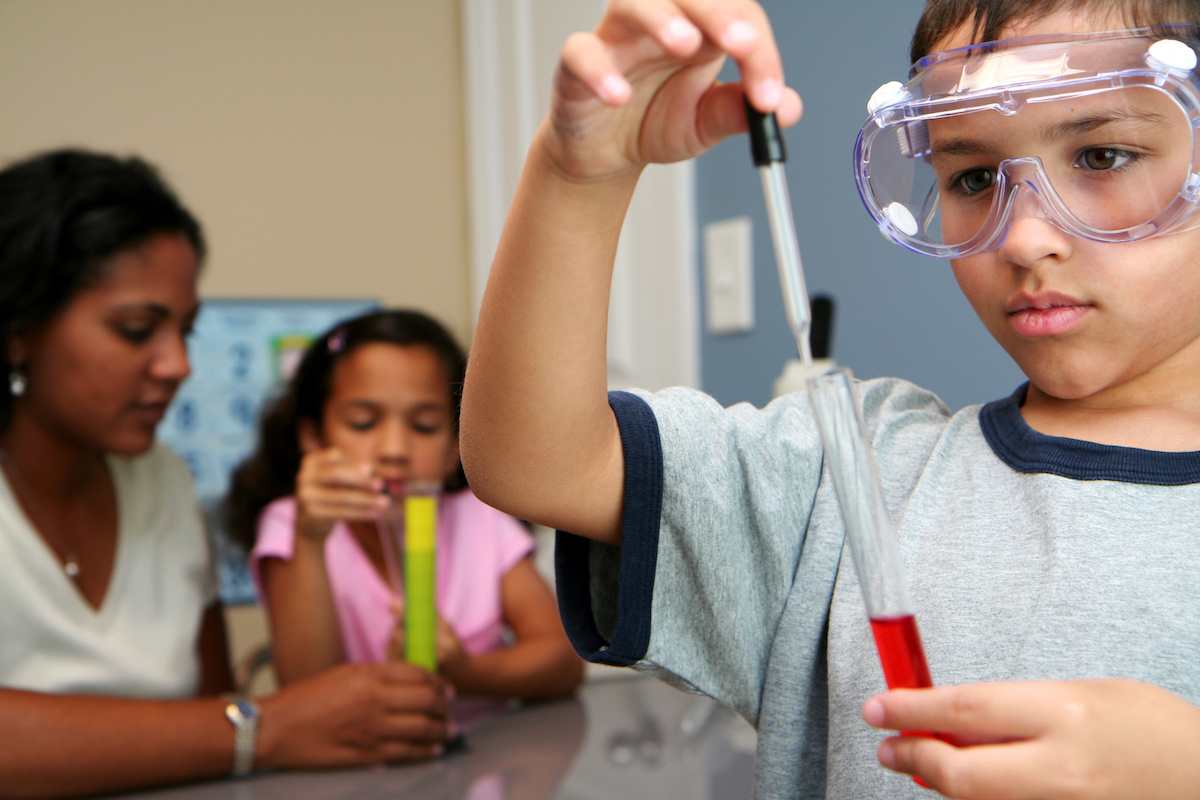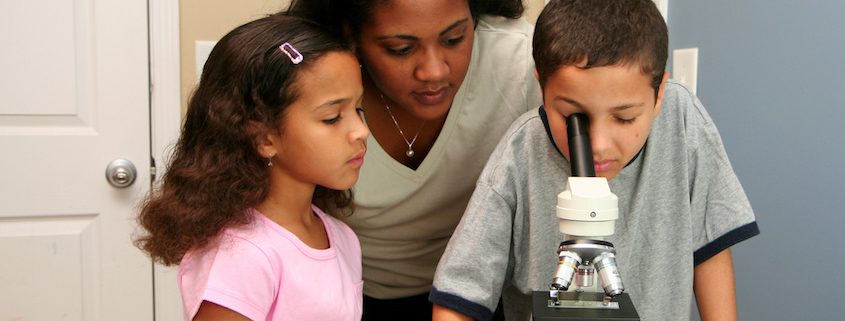Six tips when you’re explaining science to kids
“Explaining science to kids is demanding!” says Michał Krupiński, Polish nuclear physicist and science communicator. Here he shares some of is experience in the form of six tips. The main messages: “Don’t be childish, and don’t oversimplify!”.
 Being a physicist and a science communicator, I’m sometimes asked to prepare and lead scientific meetings or workshops for kids. I’m happy to agree, since this kind of audience can deliver an incredibly positive bunch of experiences and impressions. On the other hand, explaining science to kids is demanding. Usually, the preparation of workshops for children consumes much more time than for adults. But the game is worth the candle.
Being a physicist and a science communicator, I’m sometimes asked to prepare and lead scientific meetings or workshops for kids. I’m happy to agree, since this kind of audience can deliver an incredibly positive bunch of experiences and impressions. On the other hand, explaining science to kids is demanding. Usually, the preparation of workshops for children consumes much more time than for adults. But the game is worth the candle.
I highly encourage you to try – satisfaction guaranteed. Below you can find six subjective tips on how to get started with communicating science to children. Some of them may seem simple and trivial, but they really work!

Don’t be childish.  If you don’t want to read on, then just remember this one important tip. Kids hate when you talk to them in a childish way, so treat them and talk to them as adults. Of course, you need to choose appropriate, simple vocabulary and explain science in simplified way, but don’t treat kids as babies. Especially avoid hypocorism. This is the easiest path to reduce the children’s interest in your scientific story.
If you don’t want to read on, then just remember this one important tip. Kids hate when you talk to them in a childish way, so treat them and talk to them as adults. Of course, you need to choose appropriate, simple vocabulary and explain science in simplified way, but don’t treat kids as babies. Especially avoid hypocorism. This is the easiest path to reduce the children’s interest in your scientific story.
Don’t oversimplify. W e often have a natural tendency to underestimate children’s knowledge and their cognitive abilities. This causes that scientific communicators give up stories concerning advanced (but interesting) topics and focus their attention on simple phenomena, which (in their opinion) can be understood by children.
e often have a natural tendency to underestimate children’s knowledge and their cognitive abilities. This causes that scientific communicators give up stories concerning advanced (but interesting) topics and focus their attention on simple phenomena, which (in their opinion) can be understood by children.
That is not the right way. Speak simply, use simple vocabulary, but don’t overdo. And don’t avoid topics that you find difficult. You can talk to children about each scientific issue. Sometimes you just need to make an effort to find a proper way to do it. I’ve noticed that oversimplification is highly underestimated and dissembled problem in science communication, but its harmfulness is similar to the other, more famous mistake: delivering too complicated and too technical talks.
Oversimplification was a sin which I was committing often in my first contacts with kids. A cold shower for me was a meeting during which few times I heard questions such as: “We already know it, could you show us something more difficult?” or “Could you explain us how this experiment REALLY works?”. From this moment I try not to omit more advanced topics and explanations.
 Select the appropriate form of communication. Forget about classic lecture or traditional long lessons with a blackboard. In my opinion these methods should be banned in science communication for kids. Children definitely prefer experiments, games, and all kinds of physical activities, so try to incorporate them into your scientific stories. Difficult task? In some cases probably yes, but I’m pretty sure that your large creativity will allow you to come up with something new.
Select the appropriate form of communication. Forget about classic lecture or traditional long lessons with a blackboard. In my opinion these methods should be banned in science communication for kids. Children definitely prefer experiments, games, and all kinds of physical activities, so try to incorporate them into your scientific stories. Difficult task? In some cases probably yes, but I’m pretty sure that your large creativity will allow you to come up with something new.
When I was a schoolboy I remember a play called “the chemical theater”. It’s a kind of game in which kids play the role of molecules or atoms. With it, you can visualize almost any chemical reaction. To be honest, at first glance it looks a little silly, but it really helps to remember and understand what happens during the reactions. Nowadays, I use this method instead of showing drawings or animations of molecules. Kids love it. And more importantly, they understand more and remember for longer time.
 Find a helper. Even the most homogeneous group of children is diverse. Every kid has a different pace, different dexterity, and different interests. If you run workshops or experimental activities for larger groups of children, think about a helper. If you are alone it is difficult to ensure that everybody will follow your thoughts or instructions.
Find a helper. Even the most homogeneous group of children is diverse. Every kid has a different pace, different dexterity, and different interests. If you run workshops or experimental activities for larger groups of children, think about a helper. If you are alone it is difficult to ensure that everybody will follow your thoughts or instructions.
Sometimes someone can get lost. Your helper can at least partially prevent it. It doesn’t have to be a person who knows the science. His/her task will be to help children who cope less well with experiments or who want to do something different than the rest of the group. Additionally, he/she can ensure better security providing one additional pair of eyes. And last but not least, he/she can suggest new thoughts and ideas, which can improve the meeting.
 Be flexible. Few years ago I conducted a workshop on the physics of musical instruments targeted to group of children aged 9—10. I planned that the children would explore what are the differences in the sound emitted by guitar, violin, flute etc. and what those differences depend on. I borrowed and brought an impressive set of musical instruments. But to my great surprise, it turned out that a simple, small tuning fork aroused the greatest interest among participants. Almost everyone wanted to make experiments, but not with the violin, not with the flute –no, just with this tiny tuning fork which proved to be the most exciting thing in the world. Of course, all my plan for the workshop had bitten the dust, but apart from that, it was a very illuminating experience. To a large extent, also for me.
Be flexible. Few years ago I conducted a workshop on the physics of musical instruments targeted to group of children aged 9—10. I planned that the children would explore what are the differences in the sound emitted by guitar, violin, flute etc. and what those differences depend on. I borrowed and brought an impressive set of musical instruments. But to my great surprise, it turned out that a simple, small tuning fork aroused the greatest interest among participants. Almost everyone wanted to make experiments, but not with the violin, not with the flute –no, just with this tiny tuning fork which proved to be the most exciting thing in the world. Of course, all my plan for the workshop had bitten the dust, but apart from that, it was a very illuminating experience. To a large extent, also for me.
Such situations are more common than you’d expect. You never know what will be the most interesting for children. Scientific detail or side topic that is insignificant for you can cause the biggest WOW among kids. So be flexible. Do not be afraid to modify your story when children are asking about something else. Do not insist upon following your original plan. Won’t you tell exactly what you wanted? Never mind! You’ll talk about other fascinating part of science, which is also worth mentioning.
 Have fun and chill out. Don’t be a wet blanket. If children want to play longer with some experiment, let them do it. If they are fascinated by some part of your story, don’t tear off the topic. And don’t be so serious. Discover your inner child and have fun together with your audience. The amount of transferred knowledge is not the most important. Nor the number of new scientific concepts and terms. Forget about these parameters and focus on your passion and try to create friendly scientific atmosphere. Also, do not be afraid to show your sense of humor. These things make your listeners wanting to learn more in the future and to come back to science.
Have fun and chill out. Don’t be a wet blanket. If children want to play longer with some experiment, let them do it. If they are fascinated by some part of your story, don’t tear off the topic. And don’t be so serious. Discover your inner child and have fun together with your audience. The amount of transferred knowledge is not the most important. Nor the number of new scientific concepts and terms. Forget about these parameters and focus on your passion and try to create friendly scientific atmosphere. Also, do not be afraid to show your sense of humor. These things make your listeners wanting to learn more in the future and to come back to science.
- Six tips when you’re explaining science to kids - August 15, 2016




